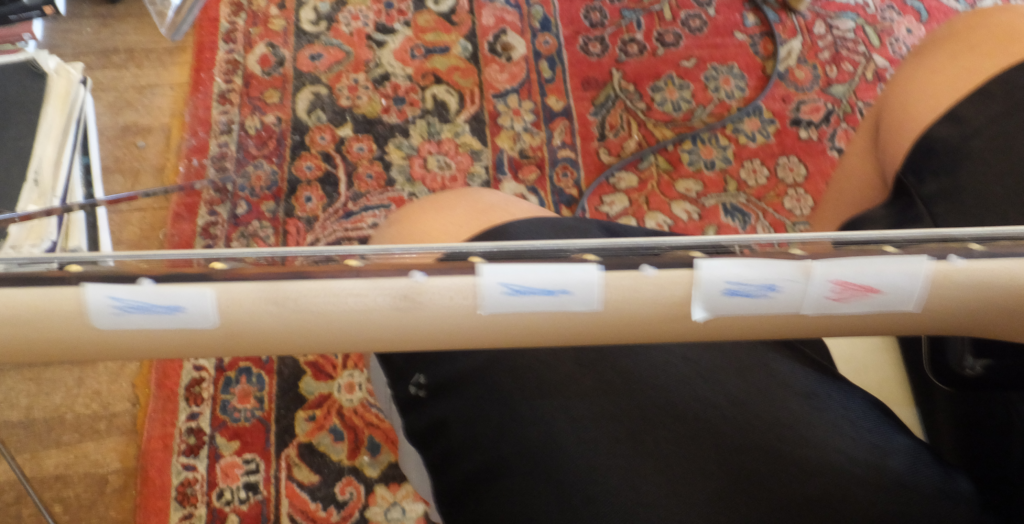Estimated reading time 4 minutes
Table of Contents
Amnesia, Alzheimer’s, Stroke, and Color Coding Music #1: Color Coding Helps Students Learn
Are you a music teacher who has a student with amnesia, Alzheimer’s, or stroke? All three conditions can have a profound effect on a person’s life. If we do our jobs well, we can help them improve their quality of life. Read more to learn how color coding music can help students with amnesia, Alzheimer’s, and strokes.
This article uses musical terms. For definitions, see the Glossary at the end of the post.

Amnesia, Alzheimer’s, Stroke, and Color Coding Music #2: Specializing in Special Needs
I specialize in special needs students (as in 8,000 hours’ worth of experience). I’ve adapted a lot of music for students with dyslexia, ADHD, and autism, including students with low expressive language.
For these students, color coding had been my go-to strategy. For information on the science behind color coded music:
Occasionally, I get students who have other issues, such as:
- Agenesis of the corpus callosum
- Amnesia
- Down syndrome
- Microcephaly
- Mitochondrial myopathy
- Stroke
- Twice exceptional
Color coding has been effective for these students as well.
- Therefore, in this post I’ll do a couple of “case studies” showing how color coding has helped with both amnesia and stroke students.
- How does color coding help? It makes it easier to interact with the score.
- This in turn will help students retain as much quality of life through music as possible.
Read the next section for information about amnesia and Alzheimer’s students.
Mobile users: for best results reading the examples, tilt your screen 90o to the right.
Amnesia, Alzheimer’s, Stroke, and Color Coding Music #3: the Amnesia Case Study
Full disclosure time, I haven’t had an Alzheimer’s student yet. However, since memory difficulties are a feature of both amnesia and Alzheimer’s, this information will most likely be relevant for teachers of Alzheimer’s students.
I had a piano student with recuring amnesia.
- She’d been in a car accident and had significant brain damage. This meant that she would literally forget everything we had worked on from the week before.
- In fact, she would forget who I was. If I acted as if I knew her, this would upset her. So, I had to introduce myself like it was the first lesson each and every week.
- Music lessons are based on the idea of learning something one week and building upon it the next week. With this student that wasn’t possible.
I quickly realized that the goal of teaching her un-adapted standard notation was out of reach.
- This meant I needed to color code the notes and rhythms in the score.
- In addition, I color coded the instrument and her fingers.
- Each week I’d quickly teach her how the color coding worked, and then I’d teach her a new song. Her parents were there to observe so they could support her during practice at home.
Here are the teaching strategies:
- Playing the Piano with Color Coded Notes
- Playing Piano with Color Coded Left Hand Notes
- Color Coding Instruments
Keep reading for the stroke case study.

Amnesia, Alzheimer’s, Stroke, and Color Coding Music #4: the Stroke Case Study
Another student was a guitarist who’d had a stroke.
- Unlike the amnesia student, he didn’t have issues with his memory.
- However, the stroke had paralyzed his left hand, so that he only had one hand he could play with.
- This meant I needed to work out how to teach a guitarist to play one-handed.
I tried a few things to figure out how to teach a one-handed guitarist:
- I tried putting a Chord Buddy on his guitar, but he didn’t have enough hand strength or coordination to press the buttons.
- I hoped to have him be able to use his left arm enough to play with a slide. However, he hadn’t retained enough control to make that work either.
- Finally, I had him play the slide with his right hand, which I put on his thumb. Then, he’d alternately pluck the strings using his index and middle fingers like on bass guitar, which he used to play. This worked.
Then, because he had cognitive issues from the stroke, I color coded the chords in his music and the frets on his instrument. Here are the teaching strategies:

Amnesia, Alzheimer’s, Stroke, and Color Coding Music #5: Final Thoughts
Here’s a summary of Amnesia, Alzheimer’s, Stroke, and Color Coding Music.
- Even though both students had physical and cognitive complications, color coding helped them each to learn music in their own way.
- I found the strategies that worked best were the ones that worked with the skills the musicians already had before their health problems occurred. For example, both the amnesia and stroke students had muscle memory from prior music lessons that lent to learning in specific ways.
- Patience and compassion will be two of your greatest assets in a situation like this. If you stick with it, you can make a real difference in your student’s life.
Related Posts:
© 2024 Geoffrey Keith
Join me for in-person or online lessons today!
Glossary
After They Can Sight-Read What’s Left for Musicians to Learn?
After they can sight-read what’s left for musicians to learn? Lots of thing spring to mind, such as: repertoire, memorized repertoire, interpretation, performance practice, improvisation, composition, music theory, and music history. Click to find out about what’s left for musicians to learn after they can sight-read. Estimated reading time 3 minutes.
Read MoreThe Gifted Dyslexic and Insight Learning (Part 4)
Have you ever wondered if you’re gifted and dyslexic? Or are you a parent of a child who’s gifted and dyslexic and want more information. Sometimes it can be difficult to recognize giftedness. Ronald Davis states, “This would commonly be recognized as daydreaming or simply not paying attention. The student is actually paying attention but has shifted to an imaginary world that is more interesting” (“The Gift of Learning” 38). How is this a sign of giftedness? Keep reading “The Gifted Dyslexic and Insight Learning” to learn about the last of our four dyslexic strengths. Estimated reading time 3 minutes.
Read MoreDiscover Which Notes Are Authentic Blue Notes
“Which notes are authentic blue notes?” The following post clears up the confusion around blue notes and has an example of a popular song that uses them. Keep reading to learn how it works. Estimated reading time 3 minutes.
Read MoreHow Can Legato Notes Be Played Staccato?
How can you make a note be long and short simultaneously? How can legato notes be played staccato? Mozart created a mixed staccato/legato notation to use in his piano pieces, and it still confuses musicians to this day. Click to answer the question, “How can legato notes be played staccato?” Estimated reading time 2 minutes.
Read More
![Amnesia, Alzheimer’s, Stroke, and Color Coding Music - Elderly Accordion Player - Perfect Pitch: Discover the Truth [Plus Absolute Pitch Test]](https://successmusicstudio.com/wp-content/uploads/2024/01/Amnesia-Alzheimers-Stroke-and-Color-Coding-Music-Elderly-Accordion-Player-1024x1024.jpg)



